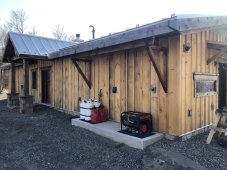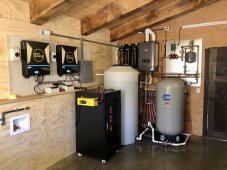S610
New Member
I am in the initial planning phase for a 1000 sq ft offgrid home (using a general contractor, no DIY stuff). Will have a 5-8KW solar system with battery backup however I think a portable propane generator may be wise (I don't want to lose a freezer full of food if the solar goes out, plus will need water from the well pump).
What is the easiest way to connect that? I would like to just have an exterior plug-in that could power the whole house instead of a transfer switch if the building code allows (Georgia). Not that I would try to power everything off a portable generator but would rather have it available to more than just the freezer.
Any suggestions? An electrician will perform the work, I just want to keep it simple. If I buy a well pump suitable for a solar system I am hoping it won't require a huge generator OR maybe I could use the generator to top off the batteries enough to start the pump? I am a clueless newbie in case that isn't obvious.
What is the easiest way to connect that? I would like to just have an exterior plug-in that could power the whole house instead of a transfer switch if the building code allows (Georgia). Not that I would try to power everything off a portable generator but would rather have it available to more than just the freezer.
Any suggestions? An electrician will perform the work, I just want to keep it simple. If I buy a well pump suitable for a solar system I am hoping it won't require a huge generator OR maybe I could use the generator to top off the batteries enough to start the pump? I am a clueless newbie in case that isn't obvious.




